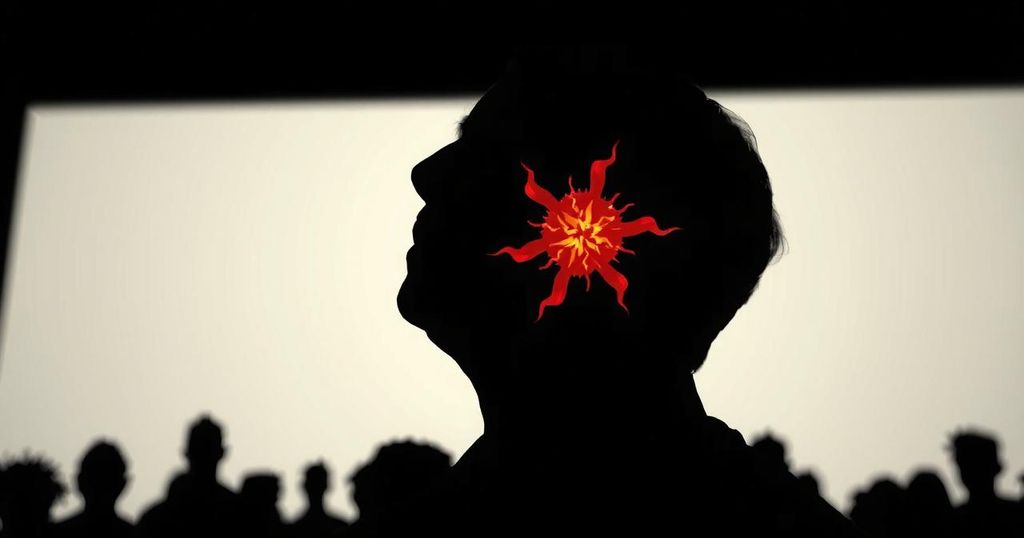Assassination Attempt on Eswatini Opposition Leader Mlungisi Makhanya
Mlungisi Makhanya, the leader of Eswatini’s main opposition party, has been poisoned in an alleged assassination attempt while in exile in South Africa. He is being treated in critical condition following the attack, which his party claims was orchestrated by Eswatini state agents. Officials from Eswatini denied government involvement, even as the political climate remains tense ahead of upcoming protests for electoral reform in the absolute monarchy.
Mlungisi Makhanya, the primary opposition leader of Eswatini, has reportedly been the victim of a poisoning, which has been described by his party, the People’s United Democratic Movement (Pudemo), as an assassination attempt. Currently, he is undergoing medical treatment in a hospital in South Africa, where he has lived in exile for the past two years due to threats to his safety following a severe crackdown on pro-democracy activists in Eswatini, the last absolute monarchy in Africa. At the age of 46, Makhanya remains in critical condition but has stabilized, according to Pudemo officials. Despite the party’s assertions of foul play, Eswatini’s spokesman, Alpheous Nxumalo, has refuted claims of government involvement, asserting that the government does not condone such actions. The poisoning incident coincides with upcoming protests advocating for multiparty elections in the nation, where political parties are technically permitted but barred from engaging in the electoral process. King Mswati III, who has ruled since 1986, is frequently criticized for suppressing dissent and leading an extravagant lifestyle. The government faces ongoing allegations of human rights abuses, particularly following the assassination of human rights attorney Thulani Rudolf Maseko last year, which incited widespread outcry. This toxicity brewing in the political atmosphere has been underscored by acts of violence against opposition figures, including an arson attack on Makhanya’s residence last September, allegedly perpetrated by state agents. Makhanya’s reported poisoning occurred early Tuesday within his residence in Pretoria, purportedly carried out by a young individual described as an agent of the Eswatini government. Upon receiving medical attention, he informed authorities that he had been poisoned and had his cell phones stolen. The deputy president of Pudemo, Wandile Dludlu, emphasized the severity of the incident, claiming a highly toxic pesticide was utilized in the attack. He characterized this act as a clear attempt on Makhanya’s life, while also highlighting the continuous risk faced by pro-democracy activists in exile.
Eswatini, formerly known as Swaziland, is an absolute monarchy governed by King Mswati III, who has held power since 1986. The political landscape is characterized by the lack of political party participation in elections, despite the legal framework allowing independent candidates. The country has recently witnessed increasing unrest, largely stemming from a violent crackdown on pro-democracy demonstrations. The opposition party Pudemo has been at the forefront of advocating for political reform and engaging in peaceful protests. Activists and opposition figures have faced severe reprisals, including intimidation and violence, as highlighted by recent events surrounding Mlungisi Makhanya and the assassination of Thulani Rudolf Maseko. This atmosphere of fear continues to cultivate a push for change amid human rights abuses and political repression.
The poisoning of Mlungisi Makhanya, a significant opposition leader in Eswatini, marks another alarming chapter in the country’s ongoing struggle for political reform and human rights. Despite the Eswatini government’s denial of involvement, opposition parties and human rights advocates view this incident as part of a broader pattern of violence against dissenters. With planned protests on the horizon advocating for multiparty elections, the situation remains precarious for pro-democracy activists, who continue to demand accountability and change in a repressive political environment.
Original Source: www.ghanaweb.com




Post Comment